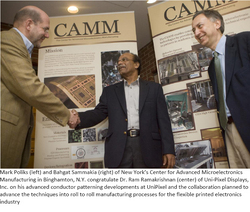Jul 8 2009
Uni-Pixel, Inc. (OTCBB: UNXL), the developer of a color display technology called Time Multiplexed Optical Shutter ("TMOS"), today announced that it has joined the Center for Advanced Microelectronics Manufacturing (CAMM) at Binghamton University, State University of New York. Supporting the CAMM's mission to demonstrate the feasibility of Roll-to-Roll (R2R) flexible electronics manufacturing, UniPixel will leverage its recent grant from the FlexTech Alliance to further advance its R2R Conductor Patterning Capabilities that it has developed for its Opcuity Active Layer Films. The company believes that its advances in inkjet patterning of conductors on thin films can become the basis for developing printed flexible circuits for solar, biomedical, micro-fluidic systems and other markets.
 Uni-Pixel Displays, Inc. Joins the Center for Advanced Microelectronics Manufacturing
Uni-Pixel Displays, Inc. Joins the Center for Advanced Microelectronics Manufacturing
Leading the project for UniPixel will be Dr. Ram Ramakrishnan who has been the key scientist behind the advances in UniPixel's conductor patterning development. During the course of development of the unique polymer films used in the company's TMOS displays, UniPixel has pioneered a method to use an inkjet printing system to pattern conductors on films at significantly thinner trace widths than previously achieved. This discovery provides the potential to enhance roll-to-roll printed electronics manufacturing by dramatically improving flexible printed circuitry, while at the same time reducing the cost of production. Dr. Ramakrishnan has led the efforts that have developed methods that use surface structure and surface chemistry to achieve sub-5 micron trace widths on the surface of flexible substrates. Currently this process is conducted in a batch environment at UniPixel where the methods and results have been well refined.
"Joining the CAMM is an important next step for UniPixel as we continue to develop our conductor patterning capabilities for our Opcuity film technology and the industry," noted Reed Killion, President and CEO of UniPixel."We believe our partnership with the CAMM will be instrumental in UniPixel's efforts to advance our conductor patterning capabilities to a high volume manufacturing process for our Opcuity film technology and the industry. Our company looks forward to our development work in this area being accelerated through the industry support and exposure that our partnership at the CAMM will bring. The tremendous team and resources available at the CAMM will be a huge support to the great work our team is doing," Killion added.
CAMM's Director and Professor of Mechanical Engineering at Binghamton University, Bahgat Sammakia, noted, "We are pleased to have UniPixel join the CAMM partnership. UniPixel's expertise in display and printed electronics provides a perfect fit with our strategic research plans. The work they have done on their unique flat panel display architecture will complement the CAMM's toolset and provide new opportunities for our members to develop new flexible electronic technologies."
While UniPixel has been engaged with the CAMM for some time, it ceremoniously signed its partnership contract with the CAMM during a recent meeting held at Binghamton on June 16. As a contribution to the CAMM's capabilities to support UniPixel's project, a specific inkjet system platform will be acquired and installed at the CAMM. This printer will provide UniPixel with the capability to support the transition of its processes and techniques.
"UniPixel's ability to advance flexible electronics and display systems can help our soldiers stay on the cutting edge of technology as they work to protect this country" said Representative Kevin Brady of Texas. "I'm also looking forward to the economic development prospects of this project. It is exciting to have such cutting edge research conducted in this area and I want to congratulate UniPixel on winning the competitively bid grant from the FlexTech Alliance."